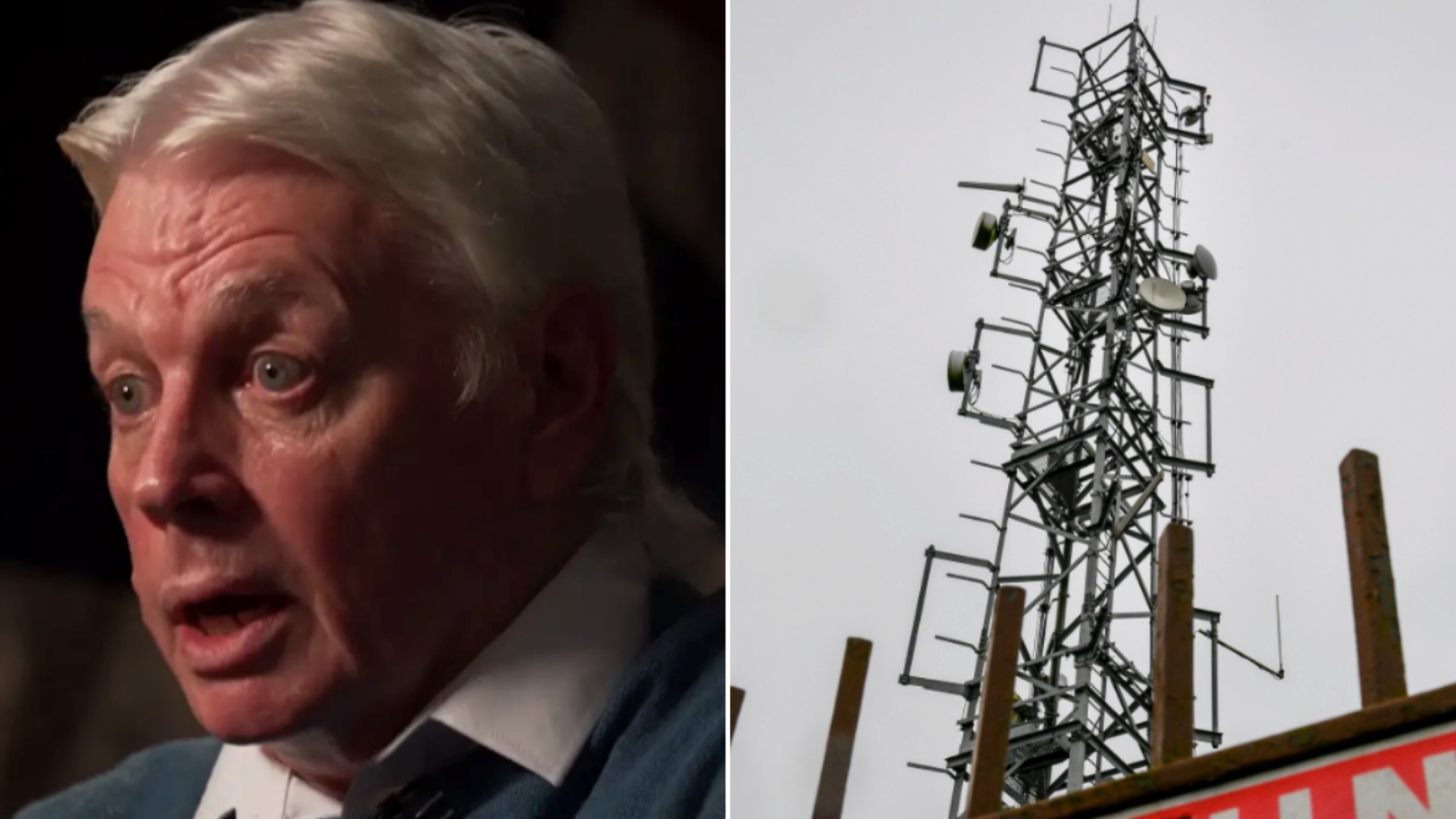Facebook removes David Icke coronavirus-5G conspiracy video

Facebook has followed YouTube in removing a video of conspiracy theorist David Icke falsely linking coronavirus and 5G.
YouTube said it will remove all conspiracy theory videos linking 5G and coronavirus in a bid to tackle a growing amount misinformation around Covid-19.
On Monday, a live-streamed interview with Icke was cross-published on YouTube and the London Real Facebook account, with more than 65,000 concurrent viewers watching on YouTube alone.
YouTube removed the video shortly after the livestream finished, while the video remained on London Real’s Facebook until Wednesday.
Shortly after ITV News contacted Facebook, the video was removed for breaking misinformation rules.
Icke made a number of claims including that a coronavirus vaccine, once developed, would include “nanotechnology microchips” which would allow humans to be controlled.
The former broadcaster added that the government lockdown was a “scam” and a way to control the behaviour of humans.
On the recent burning of 5G towers over false links to coronavirus, Icke said: “If you look at the situation and if 5G continues and reaches where they want to take it, human life as we know it, it’s over.”
Facebook said it is committed to removing misinformation which could contribute to physical harm and has 35,000 staff which monitors misinformation on its platform.
In a statement, they said: “Since late January, we’ve applied this policy to misinformation about COVID-19 which could contribute to real-world harm.
“This includes posts that make false claims about cures, treatments, the availability of essential services or the location and severity of the outbreak.
“The World Health Organsation (WHO) are providing us with clear guidance on what misinformation in relation to COVID-19 could lead to real-world harm.”
A YouTube spokesperson said: “We’re committed to providing timely and helpful information at this critical time, including raising authoritative content, reducing the spread of harmful misinformation and showing information panels, using NHS and WHO data, to help combat misinformation.
“We have clear policies that prohibit videos promoting medically unsubstantiated methods to prevent the coronavirus in place of seeking medical treatment, and we quickly remove videos violating these policies when flagged to us.
“Now any content that disputes the existence or transmission of COVID-19, as described by the WHO and local health authorities is in violation of YouTube policies. This includes conspiracy theories which claim that the symptoms are caused by 5G.”
Social media faces uphill battle in fight against misinformation
Although Facebook says it is committed to removing misinformation on its platform, research by ITV News reveals the enormity of the task.
The full video of Icke’s interview with London Real was removed from Facebook, yet shorter clips and links promoting the full video interview on external websites remained on the social media site.
ITV News also found dozens of groups dedicated to 5G, with many sharing conspiracy theories linked to the coronavirus.
Among the theories include that Bill Gates, who is funding research for a vaccine, is using it to depopulate or control the population.
There is also a theory which suggests the new £20 note shows a 5G tower giving off emissions and a coronavirus symbol. Another false theory include that 5G suppresses the body’s immune system.
One 5G Facebook group had more than 57,000 members and was averaging just under 4,000 posts by members on the group each day.
Since 2018, Facebook has had a policy of removing misinformation from its website. This includes false claims about cures, treatments, the availability of services and the severity of the outbreak.
Facebook said it works closely with other technology companies and fact-checkers to ensure misinformation is pushed down to the bottom of people’s News Feeds so that it is seen by less people and less likely to be shared.
When its third-party fact-checkers rate content as false, Facebook also puts a grey warning screen over it linking to the fact checker’s report which debunks the myth.
YouTube’s systems are able to reject exact re-uploads of videos which have been terminated from the website. However similar videos will be flagged for review to understand the context in which is it posted.
The spread of misinformation is also a problem for other social media firms, including Twitter and Instagram.
Research by data provider SEMrush found the number of tweets with “coronavirus 5G” increased from 5,007 between March 24-30 to 36,491 between March 31-April 8 – an increase of 628 per cent.
Instagram – which is owned by Facebook – is promoting coronavirus stories from health bodies and recognised news outlets, but a search on the platform showed accounts linking 5G to coronavirus.
Why do people turn to conspiracy theories?
Dr Paul Marsden, a consumer psychologist at the University of the Arts London, said conspiracy theories are often a figure of big news events as a way of people trying to “understand what’s going on around them”.
He added: “What conspiracies and urban legends do is try and take something which is really complicated and make them simple… people have a need to try and understand what is going on around them.”
He added that social media has “massively accelerated” the sharing of conspiracy theories – something which is proving problematic.
“With social media, its one to many and you can send it around the world faster than ever before. We tend to pass on more sensationalist stories rather than just facts,” Dr Marsden said.
“One of the thing we’re going to need post-coronavirus is media literacy because there are dangerous things going around.”
*** This article has been archived for your research. The original version from ITV News can be found here ***


